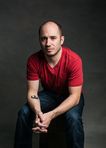Michael Moreci's Blog, page 3
January 19, 2018
Life with Black Star Renegades (So Far)
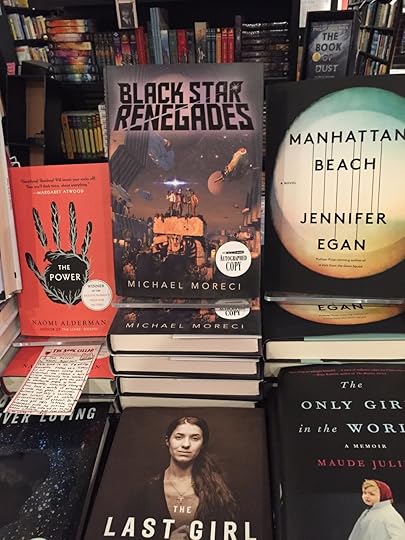
What a ride the past two weeks have been. What. A. Ride.
Over the past 17 days, I've visited and signed books at 15 bookstores; I've visited 3 cities, I've done 5 readings, made 2 television appearances, and I've seen Black Star Renegades go places I never thought possible--praise from Verge, Nerdist, Booklist, and people all over the world. It's crazy. That's the best word to describe it: Crazy.
But: I'm having the time of my life, I truly am. I've put my heart and soul into writing this book and doing every single thing I can--morning, noon, and night--to make successful enough to allow me to keep doing this thing that I love. I've never worked harder, but if it takes doubling my efforts, then that is exactly what I'll do.
There's lots more to come, and I'll keep you all posted. More readings, more signings, more everything. In the meantime, here's some pictures from the early days of Black Star Renegades!
And, of course, thank you all. Thank you thank you thank you. You all make this possible, and I never lose sight of that.

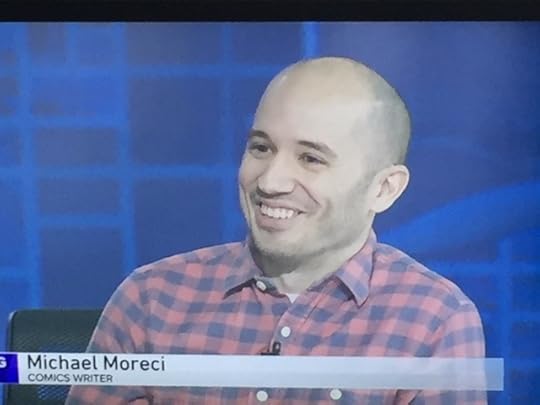
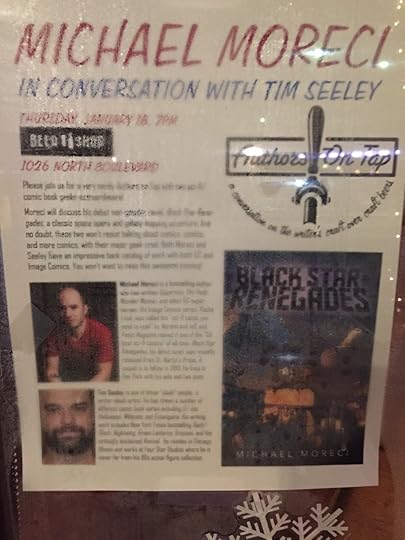
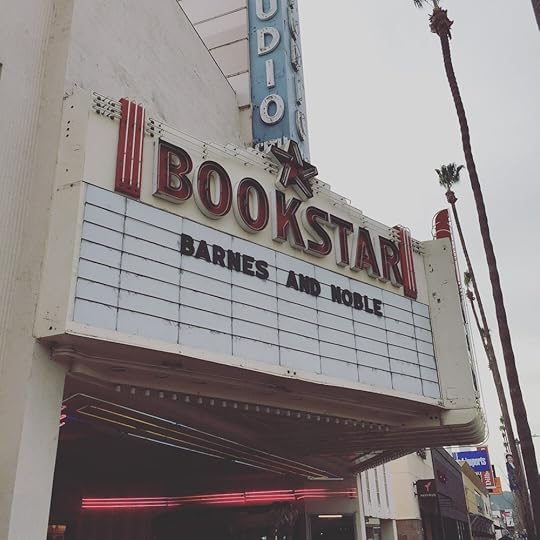
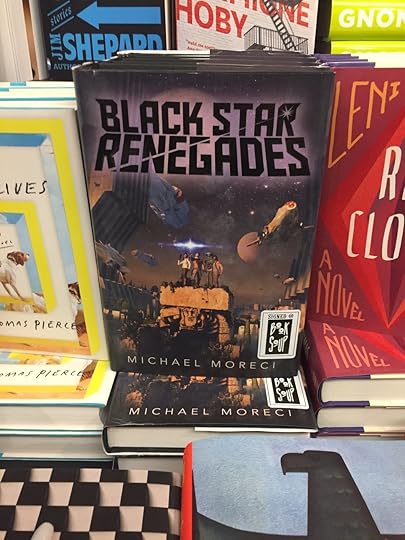
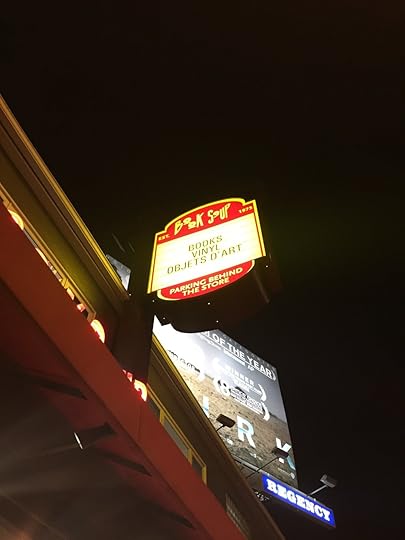
January 18, 2018
BLACK STAR RENEGADES: Reviews, TV stuff, and more
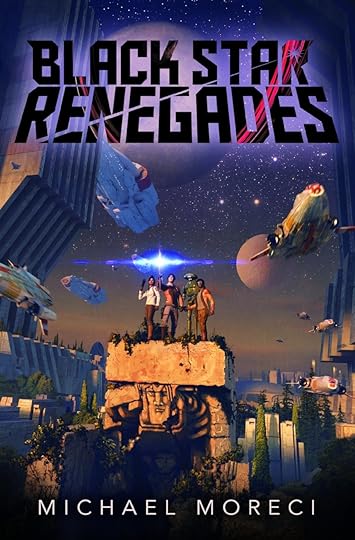
We're two weeks into BLACK STAR RENEGADES being out in the world, and it's been a wild ride. I've been traveling, I've signing at any book store that has copies, I've been interviewing with anyone who'll talk with me--in short, I'm doing everything I can, and then some, to promote this book. To let people know how much fun it is, and how they should read and, hopefully, fall in love with it.
And a good many people have, which is awesome. Here's a look at what some critics have had to say about my debut novel:
"A beach read for nerds — like READY PLAYER ONE or Andy Weir’s THE MARTIAN and ARTEMIS. It’s a lighthearted, nostalgic novel that focuses on vibrant characters and adventure, built out of recognizable parts from the likes of Star Wars, Guardians of the Galaxy, and Arthurian legend. As such, it’s a genuinely entertaining adventure that understands what people love about grand struggles between good and evil. Black Star Renegades is geek comfort food for when you want to sit back and just enjoy the ride. -The Verge
"The next big thing." -Nerdist
"Moreci’s debut novel is a delightful mash-up of genre tropes...his joy is infectious." -Booklist
"Impossible not to love" -Kirkus
"Moreci’s enthusiasm is infectious, making BLACK STAR RENEGADES a romp that nods to the classics but doesn’t forget to be its own wonderful thing." -Barnes and Noble Sci-Fi & Fantasy blog
"It's funny, fast-paced and full of satisfyingly sudden conflict...the action — as rapid as the snappy dialogue — will keep most readers pinned to the page." -RT Book Reviews
"This story has it all: rollicking space battles, secret missions, a power-hungry dictator, an order of warrior priests, and orphans and street-rats dealing with the impact of destiny upon them. Part Star Wars, part Indiana Jones adventure, with even a smidge of Firefly essence thrown in, you’re going to recognize a good number of the influences author Moreci taps into for his freshman work. But all of that is just evidence of the deep love and respect he has for his sci-fi roots. The stories we’ve grown up with these last few decades have shaped us, and this first book in the ongoing series is sure to be a hit for those hungry for another great adventure. -Fanbase Press
"One of the best genre books that I have read in many years." -Partisan Cantina
And that's just a few. So, if you like my work, if you like sci-fi, Star Wars, stuff like that--go out and get yourself a copy of BLACK STAR RENEGADES. It's at Amazon, Barnes and Noble, your local bookstore, you can get it on Kindle, Audible--whatever you prefer.
And check this out--I've been on TV promoting the book. Twice!
Once on the WGN morning show:
Then again on Fox News:
So, there we have it. I'm hard, hard at work with all things BLACK STAR RENEGADES--though, psst...I'm also working on my next series of novels. More on that soon enough...
January 5, 2018
Writers: Know Thyself
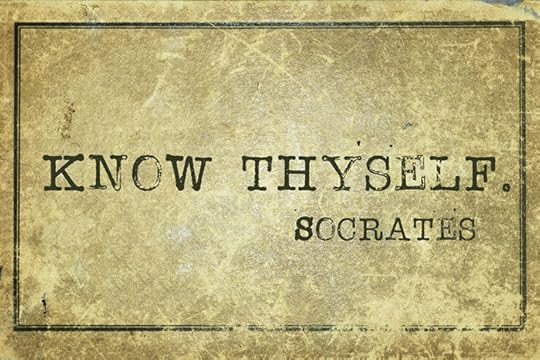
I don’t consider myself to be a great writer.
Okay, so you’re probably thinking “oh, Mike’s just being humble, of course he’s a good writer, he has a book out after all.” Or you’re thinking “yeah, no shit you’re not a good writer.” If you’re the latter, why are you reading my blog anyway?!
But if you’re the former—I’m not kidding. I’m a good storyteller. In fact, I’d say I’m a very good storyteller. I know how stories function, I know how they work, and I can cop this knowledge because I’ve studied this topic intensely. I’ve read the books on screenwriting, I’ve read the books on literary form, I’ve learned Pixar’s story method—which I think is damn near perfect—like it was tattooed on the back of my hand. So, yes, I’m confident I can tell a story (which is why I’m able to jump between comics, books, and gaming mediums).
But Hemingway I ain’t. Or is it “I ain’t Hemingway?” I think I fell prey a passive construction there. Truth be told, I don’t worry about it! What matters is what sounds good; what matters is being functional.
Now, the point of this piece isn’t to toss the rules of grammar and form out the window. Not in the least. The point, though, is to recognize what your strengths are as a writer and, with that knowledge, make the process of writing easier. Or at least less painful.
Here’s what I mean: While writing Black Star Renegades, I discovered that crafting complex prose with a good many flourishes was not only unsuitable for the book, but it wasn’t natural to me. It was a chore to try and write in this fashion, and the end result, despite my best efforts, wasn’t any good. But somehow, I thought this was how I was supposed to write. And I think a lot of writers get caught thinking the same thing, that it’s our responsibility to weave prose that’s both lyrical and artful. And if you can, if that’s your strength, then that’s exactly what you should do. But me? I discovered that my strength was in getting the hell out of my own way.
What’s funny is that now that Black Star Renegades is out, many reviews have said the same thing: That one of the best parts of the book is the way I’m able to efficiently build the story’s world and convey action that’s clear and concise. And truth be told, I take a lot of pride in that. I strive to be as clear and as compact as possible. I know it might sound trite or perhaps even obvious, but I just say what’s happening, and I leave it at that.
Take for instance the very first sentence of the book:
“Cade ran.”
Really, that's it. "Cade ran." It’s not “Through a winding hallow, as the dusk fell over the dusty bazaar, Cade slapped one foot after another on the solid stone pavement beneath his heavy feet.” That sounds terrible. But those are the kind of sentences I had to fight against myself to exorcise as I dedicated myself to saying what needed to be said in the simplest terms. What was Cade doing in this moment? He was running. That’s it. All the other details, those could be parsed out over the coming paragraphs and pages, but here and now, one thing and one thing only was happening: Cade was running. So, “Cade ran.” Bada-boom, bada-bing.
The same principle of clarity is extended to action sequences in general. In addition to reviews, I’ve had a number of writers contact me saying very nice things about how I convey action in the book, and I’m grateful for the recognition. But the truth is, all I do is keep it simple. I see so many writers try to do more when they should be doing less, especially in action scenes. What I strive to do is capture the fluidity of the moment. It’s all action and reaction and building from there. Like this:
1: Character 1 punches Character 2.
2: Character 2 reacts—by falling back, by absorbing the blow, whatever.
3: The scene builds based on Characters 2’s reaction. If he/she absorbs the blow, then Character 1 is in deep shit; if he/she is knocked back, then Character 1 continues the assault, tries to escape, etc. It all depends on Character 1’s goals. The point is simple: Action, reaction.
But I’ve read books where two characters are fighting, and between points 1 and 2, or 2 or 3, the author stops to give extraneous details about the setting or the inner workings of the character’s mind in this moment. Which is fine, to a degree. But a very limited degree. Because if you have this:
1. Character 1 punches Character 2.
2. Character 1 thinks about how he was punched as a kid in the schoolyard, and how his sled Rosebud was taken from him, and how this has defined him as an adult…
By the time you get to #3, readers will have forgotten the how this all started way back in point #1.
Now, look—I’m not out to set hard and fast rules. I’m just laying out what works for me and why, I believe, people are positively responding to certain aspects of Black Star Renegades. It’s simple: I’m doing what I do best, what comes naturally to me as a writer. And for me, what comes naturally is keeping things clear and simple.
But—and I can’t impress this enough—the discovery of knowing what I do well was born of knowing what I didn’t do well. And that understanding, that awareness, can only come by writing. A lot. The knowledge I want to pass on is simple: Know yourself. Know what your good at, know your weaknesses. Once you have a firm understanding of both, you’re better equipped to write naturally and to the best of your abilities.
December 27, 2017
All the Books I Read in 2017
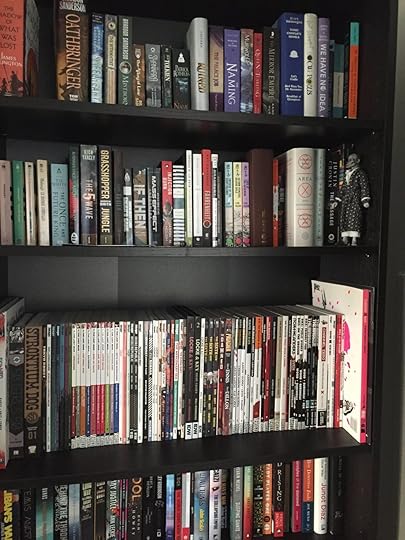
Some of you may know this, but I obsessively catalog all the entertainment I consume. I always have. Sometimes I remember to share, and this is one such year. So, here's a look at all the books I read in 2017--mostly for the first time, but there's some re-reads in there--in no particular order:
Behind the Throne, K.B. Wagers
Preacher (Book One), Ennis/Dillon
Star Wars: Rogue One, Alexander Freed
Star Wars: Dark Force Rising, Timothy Zahn
The Flash (Volume One), Williamson/De Guadmenico
Star Wars: Aftermath, Chuck Wendig
Kill or Be Killed (Volume One), Brubaker/Phillips
Teenage Mutant Ninja Turtles (Volume Eight), Waltz/Campbell
Old Man’s War, John Scalzi
Teenage Mutant Ninja Turtles (Volume Nine), Waltz/Santolouco
The Diabolic, S.J. Kincaid
The Handmaid’s Tale, Margaret Atwood
Teenage Mutant Ninja Turtles (Volume Twelve), Waltz/Santolouco
The 100, Kass Morgan
Teenage Mutant Ninja Turtles (Volume Fourteen), Waltz/Santolouco
The Chronicles of Prydain: The Book of Three, Lloyd Alexander
Dangerous Ends, Alex Segura
Archivist Wasp, Nicole Koerner-Stace
Star Wars: Join the Resistance, Ben Acker
Star Wars: Adventures in Wild Space (The Escape), Cavan Scott
Flash: Rebirth, Johns/Van Scivner
Teen Titans (Volume One), Percy/Meyers
Star Wars: Guardians of the Whills, Greg Rucka
Revolver, Duane Swierczynski
Superman: Birthright, Wade/Yu
Green Lanterns (Volume One), Humprhies
The Omega Men, King/Various
The Fifth Wave, Rick Yancey
Amulet: The Stonekeeper, Kazu Kibiushi
The Chronicles of Prydain: The Black Cauldron, Lloyd Alexander
Amulet: The Stonekeeper’s Curse, Kazu Kibiushi
The Thief, Megan Turner
The Shadow of What Was Lost, James islington
Leia, Princess of Alderaan, Claudia Grey
Battlefront II: Inferno Squad, Christie Golden
Mistborn, Brandon Sanderson
Have Sword, Will Travel, Nix/Williams
Salem’s Lot, Stephen King
Archie (Volume One), Waid/Various
Batman ’66 (Volume One), Parker/Various
An Echo of Things to Come, James Islington
Amulet: The Cloud Searchers, Kazu Kibiushi
December 17, 2017
I Didn’t Enjoy Luke Skywalker’s Story in The Last Jedi; Here’s Why I Was Wrong
What I’m about to write pretty much spoils all of The Last Jedi. Don’t read it if you don’t want it ruined. K?
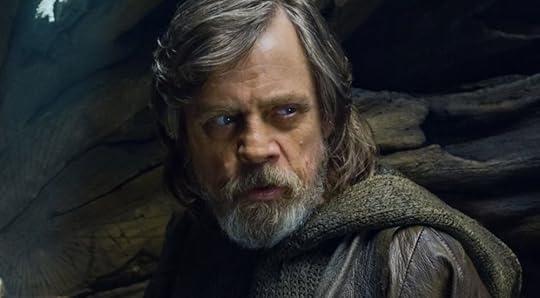
When the credits smashed onto the screen and John William’s triumphant score filled the auditorium, I adored what I’d seen. Well, almost all of what I’d seen. I found The Last Jedi to be smart, bold, emotional, and fresh. I can write for hours on the film itself and why I love it so much. But, instead, I want to write about the aspect I didn’t enjoy so much, and it was a doozy:
The treatment of Luke Skywalker.
Now, I know that expectations in art and entertainment are the path to the Dark Side. We shouldn’t gauge our experiences with stories, or judge them, based on their wish fulfillment. It’s a path laced with folly, rife with the impossible standard of giving everyone what they want while delivering something new at the same time. Expectations isn’t exactly what I’m talking about here, though. See, while watching The Last Jedi, I kept waiting to a redemptive arc to play out for Luke; I kept hoping for him to shake off the grumpy, sad, and defeated man he’d become and rediscover the hero I’ve always known him to be. In short, I wanted him to snap out of his funk and become Rey’s Jedi mentor; I wanted him to come to terms with his mistakes and return with a renewed sense of purpose.
And that’s exactly what the movie gave me; I just didn’t realize it at the time.
In my ruminations on the film—and conversations with friends—I had to really consider what I knew about Luke. Why did I want him to be a certain way? The question I had to ask—the question I think we all have to ask—is a simple one:
Who is Luke Skywalker?
Strip everything away —Luke’s lineage as the son of Anakin/Vader, as the last hope of the galaxy, as the man charged with leading a new Jedi Order because the assumption was that was what had to happen. What’s left is who Luke is at his core: A poor farm boy who grew up looking to the horizon, craving adventure and desiring to be anywhere other than the furthest point from the galaxy’s bright center.
But Luke was also hope. And not because he was a Jedi, not because he could wield the Force and fight with a “laser sword.” Luke was hope because, through his courage and commitment, he could inspire those around him to greater things. His goodness made Han so much more than just a smuggler, it helped lead a rebellion, and it redeemed the soul of his father. None of which required the power of a laser sword.
Luke only failed because he lost sight of who he was. He lost sight of the simple farm boy, looking to the horizon, craving not only his role in the galaxy but how he could make a difference within it. Once the war was over, we learned that Luke took it upon himself to bring back the Jedi Order and train a new generation of Jedi. Which, in a way, is a noble pursuit. The problem was that it wasn’t the right pursuit—not for Luke. In his attempt, Luke was inadvertently bringing back a past—the Jedi Order—that had a hand in creating the turmoil that altered the course of the galaxy for generations. The Jedi had grown arrogant and misguided; they had lost their sense of purpose and, while connected the Force, they were disconnected from the galaxy around them. And in their hubris, in their adherence to the strict demands of their order, they failed. They failed themselves, they failed each other, they failed galaxy. Yet they were considered, at the time, to be “at the height of their powers,” and there was no one around to show Luke the error of their ways. In that vacuum, he fell back on a past that wasn’t his own; a narrative he didn’t fully understand. He wasn’t arrogant to do so, he wasn’t weak. He was just doing what he thought he was supposed to do: He was maintaining the same narrative that’d been in place for generations. Unfortunately, he lost sight of the one narrative that really mattered: The one where he banded together with others—a ragtag group of rebels, scoundrels, and swindlers alike—and, with their combined power—not the power of a Jedi Order—they toppled an empire.
In the end, The Last Jedi returns Luke to his core. It strips away the burden that wasn’t his to shoulder and refocuses him at the beginning of an all-new story that is looking at him not as a Jedi master, not as a powerful sorcerer who taught others to be powerful like him in some kind of mystical (and elite) school. That’s not what those kids back on Canto Bight are seeing when they play with their Luke Skywalker action figure. They’re seeing the farm boy who rose up and fought back against those who oppressed him, who oppressed the entire galaxy. They’re seeing the hero who inspired others to be exactly like him through his bravery and goodness. And that’s why the final shot of the boy holding his broomsaber, looking to the stars, is absolutely perfect. It’s Luke. It’s a boy who knows he can be more. It’s a boy who will do great things for a great many people, just like his hero.
Luke, too, returns to that simple farm boy. Like A New Hope, The Last Jedi finds Luke looking out to the horizon filled with dual suns. Only now, Luke is no longer searching. The bitterness he harbored as Luke Skywalker, failed Jedi master, is gone. All that remains is the farm boy who could do extraordinary things and helped save the galaxy through his love, not his power. He’s back to who he’s supposed to be, leaving this world with the knowledge that Rey has found in him—and herself—the message the Luke should have imparted all along.
That is the legacy of Luke Skywalker, and I can't imagine one more appropriate.
November 9, 2017
The Slow, Difficult Pursuit of Creative Success

A few weeks ago, I received an email from my book editor at St. Martin's, forwarding me a review from Kirkus. Now, let me say one thing before talking about Kirkus: I do not feel like a real author. Yes, I have a novel coming out. Yes, I've written a whole lot of comics in the past, and I continue to do so. But I feel like, any day, I can be outed as a fake, a fraud, a phony, and never be allowed to write another word again (and, should that day come, quite honestly I have no idea what I'd do with myself). Do all writers feel this way? Probably, to a degree. I can't say for certain--all I know is, deep down, I don't feel like I belong, and I'm just waiting to be ousted.
There's little moments, though, that get me through these festering doubts. One came with the aforementioned email from my editor, sharing the Kirkus review with me. Kirkus, for those who don't know, is a tough nut to crack. Their business is reviewing books, and they're not easy to impress. But somehow, for some reason, they liked BLACK STAR RENEGADES. A lot. Quoteth:
"These are all the same beats used in everything from Joseph Campbell’s mythology to George Lucas’ enduring saga, but Moreci has assembled them with such devotion and style that it’s impossible not to love this strange mashup...this shiny space opera is bound to be a pleasure for fans of all stripes."
I almost fainted reading it. I want to print out dozens of copies of that review and stitch them into a suit to sleep in, which just might get me through the weeks leading up to and soon after the release of BLACK STAR RENEGADES. I won't, because that would be super weird. But I could.
For a little while after reading this review, I felt like a bona fide writer. Like, for a weeks I can claim the title. And as I thought about how thrilling it was to see that review (honestly, words cannot do justice to how good the Kirkus piece made me feel), I started to consider the long, long road it'd taken to get to that point.
It's funny, because this all happened right around New York Comic Con (NYCC). As I was thinking about success and validation and all that, I had a flashback to one of my most terrible comic convention experiences, which happened to be NYCC 2014. Don't get me wrong--I love that show and the people who run it. My experience was specific to me and nothing else. And it was, without question, a creative bottom for me.
Back in 2014, I was right on the cusp of being totally done as a writer. I say on the cusp now, but at the time, I actually thought I was done for. See, I'd released an Image Comics series two years prior called HOAX HUNTERS, about a reality TV show that debunks myths and legends on camera while covering up the real truth behind the scenes. It's X-FILES meets MYTHBUSTERS. While Hoax Hunters sold on par with your mid-range Image books at the time and people seemed to like it (though, I swear, if as many people who ask about it now had read it then, we'd be on issue #78), the book did not balance its ledger. By issue #10, I was thousands of dollars in debt financing the book, and that hole was only getting bigger and bigger. My co-writer, Steve Seeley, and I did everything we could to get our sales numbers up, but nothing worked. Like 99% of all comics, the sales numbers kept slipping and slipping, and our debt kept growing and growing. It was stressful, to say the least.
Meanwhile, I couldn't get anything else off the ground. Marvel and DC never even returned my emails, nor did really any comics company--and that meant I couldn't get work for hire gigs that, at the very least, would help balance out the money I was bleeding on Hoax Hunters. I'd sent a good number of pitches to Image, and nothing got taken. I was, in short, stuck. All I had was a slowly dying book, a bunch of debt, and very few prospects for the future. And there I was at NYCC, wondering what in the world I was doing with my life. I remember standing at my artist alley table, kicking myself because I'd taken time away from my day job and my two year old son only to lose money at a comic con. I was terrified that my career was over. I'd put everything I had into Hoax Hunters, and it wasn't enough.
But things change. At that same NYCC, a book I'd gotten accepted at Boom! Studios was announced: CURSE, my modern-day werewolf tale co-written with Tim Daniel. At the time, I was so low that I was more terrified by releasing a new book than excited. It was hard to imagine experiencing another Hoax Hunters.
CURSE, though, was a big success. Along with Tim, I'd taken all my anxiety and frustrations--personal and professional--and poured it into this book. It was met with a bunch of acclaim from critics, some end of year accolades/awards, and really strong sales.
There were some peaks and valleys from there. Tim and I followed CURSE with BURNING FIELDS, which is probably one of the best things I'll ever do. It's right up there with ROCHE LIMIT, which is, and always will be, my baby. My strange, trippy, challenging sci-fi baby. But, at the same time, Marvel and DC still wouldn't return my calls, I was working a day job--which meant I was chained to a desk all day and night, as I desperately punched the keys in the hopes that I could somehow make a career out of my fictional worlds--and I STILL hadn't paid off my Hoax Hunters debt.
But I kept going. Little by little by little. Jump ahead a few years, and BLACK STAR RENEGADES somehow became a reality, and I'd achieved a lifelong dream of writing a novel. I finished it and, for reasons that mystify me, Kirkus enjoyed it. And for a short while, I felt like a real writer.
So--I'm not boasting. Not bragging. What I'm trying to convey is that success takes a long time, and you probably have to crawl over broken glass to get there. But I'll say this, and I say it without a shred of doubt in my heart and soul: I'd rather be in the game getting my skull cracked in than watching watching everyone else play from the sidelines. And if you've read this far into this post, than you're probably the same as me.
You need luck, fellow writers. But you also need to be too damn stubborn to ever stop--you need to endure--until you get to feel, even if for a moment, that you're a real writer.
October 4, 2017
New York Comic Con, Kirkus review of Black Star Renegades, and a Seeley Endorsment

Talk about long blog post titles. I think this one is a personal record!
A few things are going on in the BLACK STAR RENEGADES universe, so now that we've all been exhausted by the post title, let's get to it without delay!
First, if you're going to be attending NYCC, then you should mark it down to swing by the St. Martin's Press/Macmillan booth on Saturday between noon at 1. Because if you do, you'll score yourself a FREE advance copy of Black Star Renegades. But be advised--we had 4x the stock at SDCC, and we blew through every single book. So be there, and be there early!
Also, Kirkus Reviews had positively glowing words to say about Black Star Renegades, which is so cool. Kirkus is a huge, and influential, book review site. To get a good review from them--a great one, even--is a big deal.
Here's a little bit of what they said:
"an unapologetic love letter to Star Wars...These are all the same beats used in everything from Joseph Campbell’s mythology to George Lucas’ enduring saga, but Moreci has assembled them with such devotion and style that it’s impossible not to love this strange mashup for its own sake. From intergalactic space battles to blaster fights to rogue robots and various hives of scum and villainy, this shiny space opera is bound to be a pleasure for fans of all stripes."
You know and love Tim Seeley, right? Who doesn't? He's given us Hack/Slash, Revival, and soon, Imaginary Fiends. Also, he's written out of this world Batman and Nightwing. To say Tim is a great writer is an understatement--and he's also a man of refined taste, obviously, because he had great things to say about Black Star Renegades. See for yourself:
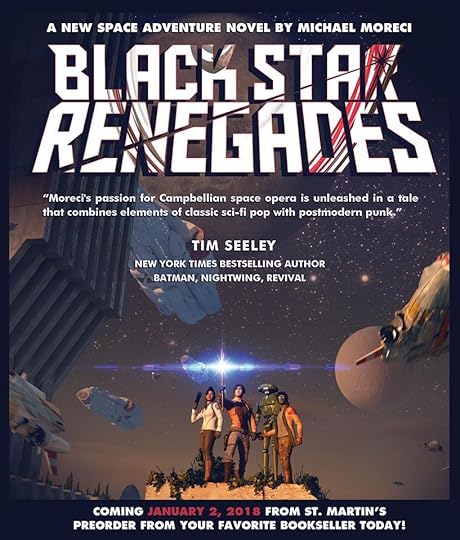
And, finally, remember that if you preorder Black Star Renegades, you'll have my love and gratitude for ever and ever. Preorders are SO important, so vital. And if you are wondering how/where to order, I've got you covered!
October 2, 2017
Halloween Spooktacular!
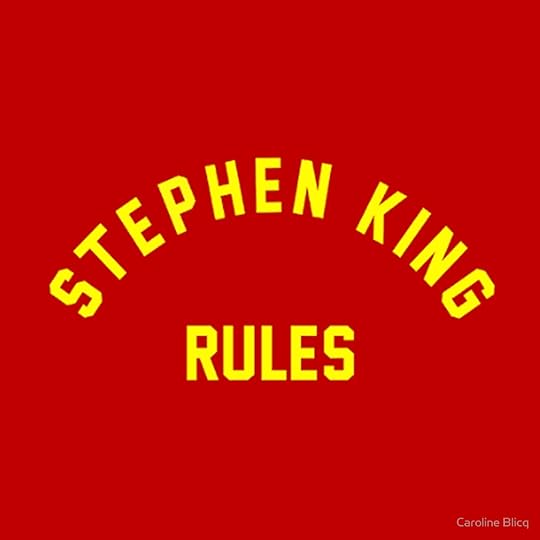
As most of you know, I'm a big horror fan. I wouldn't have written Curse, Hoax Hunters, Burning Fields, and other horror-fueled fiction if I wasn't. It's no surprise, then, that October is my favorite month and Halloween is my personal favorite holiday. And every year, I dedicate the month to watching horror movies (some new, some old favorites) and reading horror novels.
This year is especially exciting for me because, to be honest, my Halloween tradition has been on hiatus for about three years. Not for lack of love of the genre, but a different reason:
Kids.
Having kids made it truly difficult for me to enjoy horror the way I used to. Granted, I was never into the kind of horror that's relentlessly bleak or sadistic, but still. With the stakes in my life higher than I could have ever imagined them to be (being a parent will do that to you) it was hard for me to see people in jeopardy, hard for me to see people hurt--or worse.
I can probably sit on a therapist's couch and dive into this (amongst other things) for many, many hours. But let's just leave it at what I said: I had kids, and horror became way too real and unsettling to me.
But now I'm back.
Since I'm resuming my tradition, I figured I'd share my slate of the movies and books I plan on consuming between now and Halloween, just for fun. You'll notice it's very heavy in Stephen King, and for a few reasons. One, he's The Master (not just of horror, but of storytelling in general) and also my longtime favorite. I've been reading King novels and watching King movies since I was way too young to have been appropriately doing either. Thank goodness for my very liberal parents, though, who let me watch Nightmare on Elm Street when I was six years old.
Also, we're in the middle of a Stephen King renaissance, and I'm loving every second of it. There's a long King essay essay in me, an appreciation of everything he's contribute to fiction, horror, and the written word. But for now, I'll leave say this: Growing up, there were two things that influenced me more than anything else: Star Wars and Stephen King. Thank the gods we're still getting more of both.
Without further rambling, here's my October lineup!
Movies:
-Gerald's Game
-Little Evil
-Young Frankenstein
-It Follows
-Pet Semetary
-Stranger Things (rewatching season 1 and binging season 2)
-Get Out
-The Conjuring
-The Shining
-Halloween
-The Thing
Books:
-'Salem's Lot
-We've Always Lived in the Castle
-Boy's Life
-The Long Walk
-Locke and Key (cover to cover reread)
September 18, 2017
Grant Morrison Likes BLACK STAR RENEGADES!
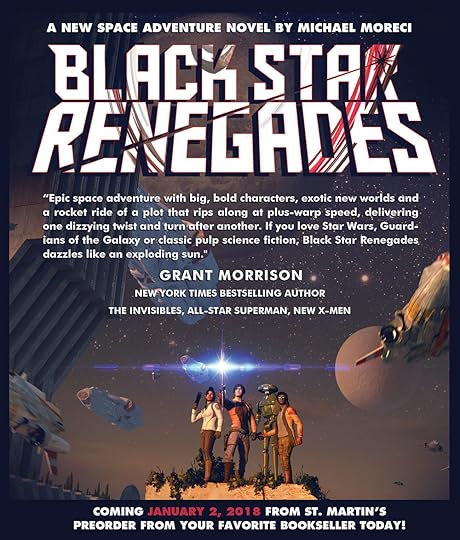
This isn't a drill! Grant Morrison--THE Grant Morrison--had very flattering things to say about Black Star Renegades!
So, if you trust Grant and you want some more fun space adventure romps in your life, this is the novel for you. Coming January 2, 2018, but you can preorder today!
September 11, 2017
Five Great Books On Writing

This is an oldie post of mine, but I've been asked a lot lately about books on writing. So, here we go!
I don’t remember where I heard this great Somerset Maugham quote, but it has stuck around inside my head for years. It goes:
“I write when inspiration strikes. Thankfully, it strikes every morning at nine a.m. sharp.”
I’ve never considered myself the most talented writer, and I’m not saying that out of insecurity or modesty. When I started my first real writing program in college, I was able to pinpoint writers who I knew were flat-out better than me. The ease of their skill was apparent, and I knew I wasn’t at that level. They had a certain eloquence to their work and a clarity of voice that takes most writers years to perfect, assuming they reach that point at all. Don’t get me wrong, my compulsion to write was just as strong as theirs, if not stronger, but what kept me in the race then, and now, was my commitment to seeing writing not as a gift granted by the muses but as a skill that needed to be developed, fostered, practiced, failed at, practiced more, and, eventually, controlled. I always like to think of the tool belt analogy—talent is your tools (and I believe that if you’re compelled to write, you have talent; this world couldn’t possibly be so cruel to provide the former without the latter). But tools are only as good as your ability to use them. Sure, drills are a ton of fun; but until you learn now to use it, all you’ll do is make holes in things.
My writing philosophy, needless to say, is very blue collar. I come from a Teamster family that has a standard for success set by how much and how hard you work. That said, I believe that there’s only one sure way to become a skilled writer, and that’s by learning how to write. And part of learning how to write is by doing it—repetition, routine, commitment, practice, practice, practice. The Malcolm Gladwell 10,000 hour rule. But there’s another equally important part, and that’s learning craft from the masters.
Going back to the tool belt, one of the most elusive tools that is essential to learn and deploy is voice. Voice is equally the easiest and hardest thing to discuss when it comes to writing. What is your voice? Well, that’s easy. It’s the characteristic of your writing that makes in unmistakably you. Think about great voices throughout literature. Kurt Vonnegut, Junot Diaz, Thomas Pynchon. You pick up their work and identify their voice without knowing beforehand. Vladimir Nabakov put it best when he said that the best novels teach you how to read them through the actual reading experience. Every voice is different, therefore every book needs to educate you on its intricacies.
But, at the same time, what makes these voices unique? What’s the quality that makes Lorrie Moore so different than Jonathan Lethem? Sure, there’s a case to be made for content and stylistic tics, but beyond that, how is this voice not that voice? After all, it’s just words on a page. Words, sentences, paragraphs. That isn’t meant to diminish voice, but rather to point out how mysterious the idea of voice is and, therefore, how hard it is to guide a writer into finding their voice. Because, after all, voice is you—your experiences, your history, your beliefs, all of you—coming through the stories you tell and how you choose to tell them.
That said, one of the greatest strengths a writer can possess is having control of their work, understanding the choices that need to be made—in style and content—and how best to make them. This is where the aforementioned masters and their thoughts on craft come into play. Many writers have written about writing and, I can promise you, I’ve ready far too many of these books over the years. There’s a few that have, like the Maugham quote, have stuck with me through their ability to illuminate what’s happening on a page and how you can use that knowledge better your own work.
Here’s a look at the books that I’ve held close—dog-tagging them, highlighting, writing notes in the margin—on my path to becoming a writer:
1. Finding a Form, William H. Gass: Darth Vader once said “you underestimate the power of the dark side.” To me, the same goes for William Gass—most people underestimate the power his fiction, as well as his thoughts on fiction, hold. Gass is understood to be a capital D Difficult writer and somewhat curmudgeonly about it. After all, it takes some gall to write an essay saying that the Pulitzer is basically a bunch of bullshit. Nonetheless, when it comes to understanding and executing a precise and controlled form in fiction, there aren’t many people who can hold a candle to Gass. Form, for Gass, is everything, and reading his thoughts is a potent reminder of the power every macro decision has on impacting the whole. Every word choice, every deployment of a particular sentence, must serve the ultimate benefit of making something supremely worthwhile in itself. It’s a high standard to meet, but reading Gass does grab you by the lapels and give you the shake that is sometimes needed.
“I believe that the artist’s fundamental loyalty must be to form, and his energy is employed in the activity of making. Every other diddly desire can find expression; every crackpot idea of local observation, ever bias and graciousness and mark of malice, may have an hour; but it must never be allowed to carry the day.”
2. On Becoming a Novelist, John Gardner: On the opposite side of the squared circle is John Gardner, who drops a flying elbow on Gass’s devotion to form. Which is good—neither is right, of course, and there’s much to be learned from understanding both and absorbing the best of both methods. For Gardner, story reigns supreme as he believes that readers demand two things to keep them going—argument and story. Gardner is really big on capturing the human experience in writing (it’s no wonder he became Raymond Carver’s mentor) and doing so in a way that doesn’t call attention to itself. He believed writers should find a balance between prose that has too much language sensitivity and prose that has none at all. But, above all, he’s a humanist, seeking truth, wisdom, and love.
“The writer with the truly accurate eye (and ear, nose, sense of touch, etc.)has an advantage over the writer who does not in that, among other things, he can tell his story in concrete terms, not just feeble abstractions.”
Gardner is practical, passionate, and his advice is soaked with experience and care.
3: Reading Like a Writer, Francine Prose: One of the best way someone can learn to write is to read. A lot. And read everything. Prose tackles the subject of whether a writer can be taught or not, and she does so through insights into her own development as a writer and the books that have educated her over the course of her career. Using numerous examples from a wide range of novels, Prose illustrates how to craft dialogue, build character, delicately choose words, and so on. She’s passionate, exuberant, and wise, being alongside her on her journey through reading and writing is truly a joy.
“One essential and telling different between learning from a style manual and learning from literature is that any how-to book will, almost by definition, tell you how not to write. In that way, manuals of style are a little like writing workshops, and have the same disadvantage—a pedagogy that involved warnings about what might be broken and directions on how to fix it—as opposed to learning from literature, which teaches by positive model.”
4: Aspects of the Novel, E.M. Forster: No writer has taught me more about crafting characters than Forster. Don’t get me wrong, there’s plenty of wisdom to absorb from this book, particularly Forster’s thoughts on story and plot (which are pretty hilarious, in addition to insightful). But Forster’s thoughts on flat vs. round characters struck me in the gut when I first read it. I think all young writers are taught that their writers should feel real and exist beyond the page, but that’s all very nebulous and doesn’t give you a concrete sense of when a character does and doesn’t feel real. Forster elevates the discussion in a very concrete way through his discussion of flat and round characters.
“The test of a round character is whether it is capable of surprising in a convincing way.”
That one sentence speaks volumes to me, for two simple reasons: surprise and convince. A character you’re not invested in will never surprise you; they might shock you, but that’s a totally different thing. Cheap thrills don’t make for genuine surprise. You have to really know a character for them to surprise you because what you’re recognizing is that they’re behaving in a way that isn’t them. “Oh no, Harry Potter would never do that!” You can only own that statement by understanding what Harry WOULD do. Should he act in a way that defies that—because you feel you know him—is what brings about genuine, and impactful, surprise.
And you have to be convinced. If Harry Potter suddenly got fed up with Ron Weasley and took an axe to his head, well, we wouldn’t buy it (also, this would be a shock, not a surprise). Surprises must be earned; even though a character is behaving in a way that, again, goes against their grain, you have to look at the behavior and feel that it’s warranted. You have to understand why he or she is doing this. Even though it’s not literature (though it’s very literary), the first two seasons of Breaking Bad delivered a master class in surprising its audience in a convincing way. No matter how low Walt sunk, no matter violent and ruthless means he used to achieve his ends, the audience was immersed in his reasons for doing so. I remember the moment where Walt watched Jessie’s girlfriend overdose, choke, and die in her sleep and, as horrifying as it was, my mind said “yeah, but I get it.” Walt’s quasi-paternal relationship to Jessie was so thoroughly executed that his girlfriend’s death, while tragic, probably saved his life in the long run. As Walt watched her die, I was convinced of his reasons for doing so.
5. Zen in the Art of Writing, Ray Bradbury: No matter how miserable writers may be, they need to love writing. And no one, as far as I can tell, loved the act of writing more than Ray Bradbury. I recently went back to this book, and it hit more than it ever has. Maybe it’s my older age that makes me appreciate the joy of writing more than I ever have. When I was in my twenties, it was easy to stay convicted to my writing career as the stakes were remarkably low. I didn’t have kids, a mortgage, and other things to fill me with crippling fear every minute of the day. Now that I do, staying committed to writing is more difficult, though it’s also much more rewarding as I enjoy the actual process more than I ever have. I absolutely have to, as the life and career of a writer isn’t easy (I can write about the vicissitudes of a career in writing at length); what is easy, though, is loving the work and the outcome. Bradbury has taught as much, if not more, than any other writer. And now, he’s taught me something new, something that all writers should remember: writing is a delight, not a burden. And for all the lessons on craft, form, and everything in between, none of it means all that much without that love.
I’ll let Bradbury close things out with the exuberance only he can bring:
“Zest. Gusto. How rarely one hears these words. How rarely do we see people living, or for that matter, creating by them. Yet if I were asked to name the most important items in a writer’s make-up, the things that shape his material and rush him along the road to where he wants to go, I could only warn him to look to his zest, see to his gusto.”

